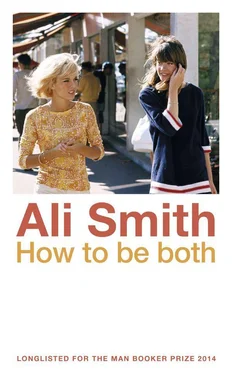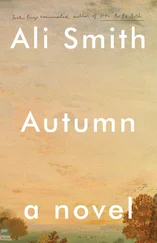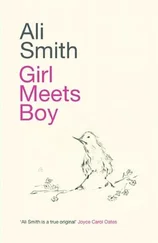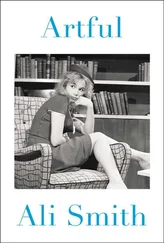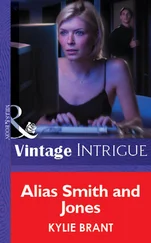Six months before she dies and shortly before she gets depressive about her friendship fizzling out with that woman Lisa Goliard, George’s mother comes into the living room. It is a Sunday evening. George is watching a programme about the Flying Scotsman, a train from the past, on TV. But because George came in halfway through this programme and missed the beginning, and because it is an interesting programme, she is simultaneously watching it from the start on catch-up on her laptop.
On one screen the train has just broken the hundred-mile-an-hour record. On the other screen the train has just been superseded by cars. At the same time George is looking up photobombs on her phone. There are some very brilliant and funny ones. There are some you can’t believe haven’t been digitally enhanced, or look like they must have been set up but the people who took them swear they haven’t.
You, her mother says watching her, are a migrant of your own existence.
I am not, George says.
You are, her mother says.
What’s your problem, dinosaur? George says.
Her mother laughs.
Same problem as yours, she says. We’re all migrants of our own existence now. In this bit of the world at least. So we better get ready. Because look how migrants get treated all over the world.
Sometimes your political correctness is so tedious that I find myself fall —, George says.
Then she mimes falling asleep.
Don’t you ever want to simplify? her mother says. Read a book?
I read all the time, George says.
Think about just one thing, instead of fifteen all at once? her mother says.
I’m versatile, George says without looking up. I’m from the versatile generation. And you’re supposed to be the great online anarchist. You should approve of me being so savvy.
Savvy, yes, her mother says. Always be savvy please. I’d need that from any daughter of mine. Otherwise, what with me being so politically correct and everything, I’d be sending you straight to the orphanage.
Properly speaking, that would mean both you and dad would have to die, George says.
Well, one day, her mother says. With any luck later rather than sooner. Anyway. I don’t actually care how many screens you look at at once. I’m just doing my concerned-parent bit. We all have to. It’s in the contract.
Blah, George says. You’re pretending you’re being cool about it now because online interventionism was once perceived for about three months several years ago to be cool –
Thanks! her mother says. Ratified at last.
— but really you’re just as paranoid as everybody else over forty, George says, all sackcloth and ashes and stuck in the past, hitting your chests with a scourge and ringing your little bells, unclean! Unclean! Disempowerment by information! Disempowerment by information!
Oh, that’s good, George, her mother says. Can I have that?
For a Subvert? George says.
Yes, her mother says.
No, George says.
Please? her mother says.
How much will you pay me? George says.
You’re a born mercenary, her mother says. £5.
Done, George says.
Her mother takes a note out of her purse and writes on it in pencil, in the white space between the picture of Elizabeth Fry and the drawing of some of the women prisoners she helped, the words disempowerment by information paid in full .
Then: George spent that £5 note the day after. She liked the thought of releasing it into the wild.
Now: George wishes she hadn’t spent that £5 note. Somewhere out in the world, if no one’s rubbed it out and it hasn’t worn off, her mother’s handwriting is passing from hand to hand, stranger to stranger.
George looks at the word GARDEN under DANCE THING, in her own handwriting. The dance bit will take less than five minutes and the film of the girl is forty five minutes long, and she can’t usually bear to make herself watch more than five of those terrible minutes.
Dance thing. Garden. Then Henry standing like a Victorian child from one of the sick sentimental songs about death and orphans, holding his hands in the prayery way in which he’s been holding them since he saw Carols from King’s on TV last week. Then her father trying to pretend he’s not drunk, or getting up still drunk and sleeping it off till lunchtime on the couch, then trying to think up an excuse to go somewhere for the evenings with people who’ll think the only good thing they can do for him is get him drunk, and he won’t be back at work until after the weekend which means five more days of drunk.
It is only about ten past midnight. Hardly any time has passed. The fireworks are still going off sporadically outside. The rain is still drumming on the Velux. But her father is not yet home and probably won’t be for ages and George has decided to wait up for him in case when he gets home he can’t get up the stairs by himself.
There’s a noise outside her door.
It’s Henry.
He is standing in the doorway looking tearful and fevered and bizarrely a little like an illustration of Little Lord Fauntleroy now that his hair is so long.
(He is refusing to have it cut because she always cut his hair.
Henry, she’s not coming back, George has said.
I know, Henry said.
She’s dead, George said. You know that.
I don’t want my hair cut, Henry said.)
You can come in, George says. Special dispensation.
Thank you, Henry says.
He stands at the door. He doesn’t come in.
I’m really awake. I’m really bored, he says
He is near tears.
George goes over to her bed and folds down the covers and pats it. Henry comes into the room, comes over to the bed and climbs in.
Toast? George says.
Henry is looking at the photos of their mother George has put above the bed. He reaches his hand up to one of them.
Don’t, George says.
He is good, because so recently asleep. He turns round and sits down.
Two slices please, he says.
With jam? George says.
No butter, whatever you do, he says.
I will bring you two slices of toast, George says. And after you’ve eaten them you and I together will banish boredom.
Henry shakes his head.
I don’t mean bored, he says. I want to be bored. But I can’t. But I really don’t want to be this thing that I’m having to be instead of being bored.
George nods.
And Henry, she says. Don’t touch those photos while I’m gone. I mean it.
George goes downstairs and makes a single slice of toast. She knifes over it with quite thick butter then puts the butter knife straight into the jam without washing it because no one will even notice. She does it precisely because no one will, because she can leave dregs of butter in whatever jam she likes for the rest of her life now.
By the time she gets back upstairs Henry is asleep. She knew he would be. She takes the photo he’s unstuck off the wall out of his hand (the picture of her mother as a teenager sitting on a statue in a park in Edinburgh right up on the back of the horse of whoever the man is the statue happens to represent) and sticks it back in its place (she has arranged them so that there is no chronology).
She sits down on the floor, leans back against her own bed and eats the toast.
It’s so boring , she says in Italy in the palazzo in the mock-child voice they always use for this game.
Only you would come through the doors of a palace designed especially to dispel boredom and know to say out loud, by some magic understanding of the meanings of things, that you find it boring, her mother says.
But George is playing the what’s-the-point-of-art game. Maybe her mother hasn’t realized she’s playing it.
There’s nobody else in this whole place but us, she says still in the voice. What’s the point , what’s the point of it? What’s it got to do with anything ? What’s the point of art?
Читать дальше
